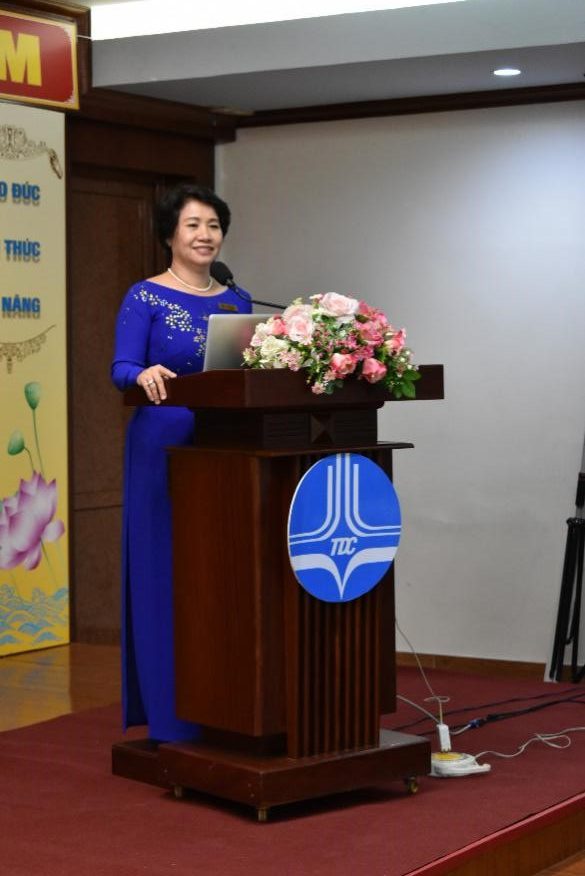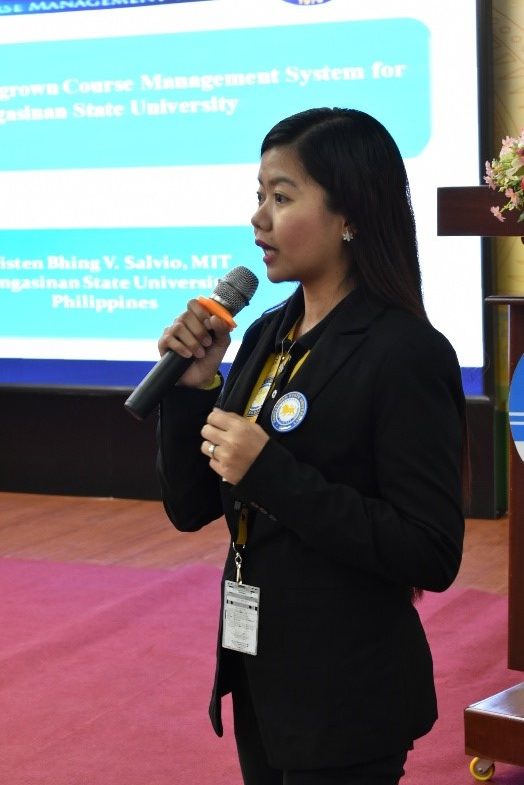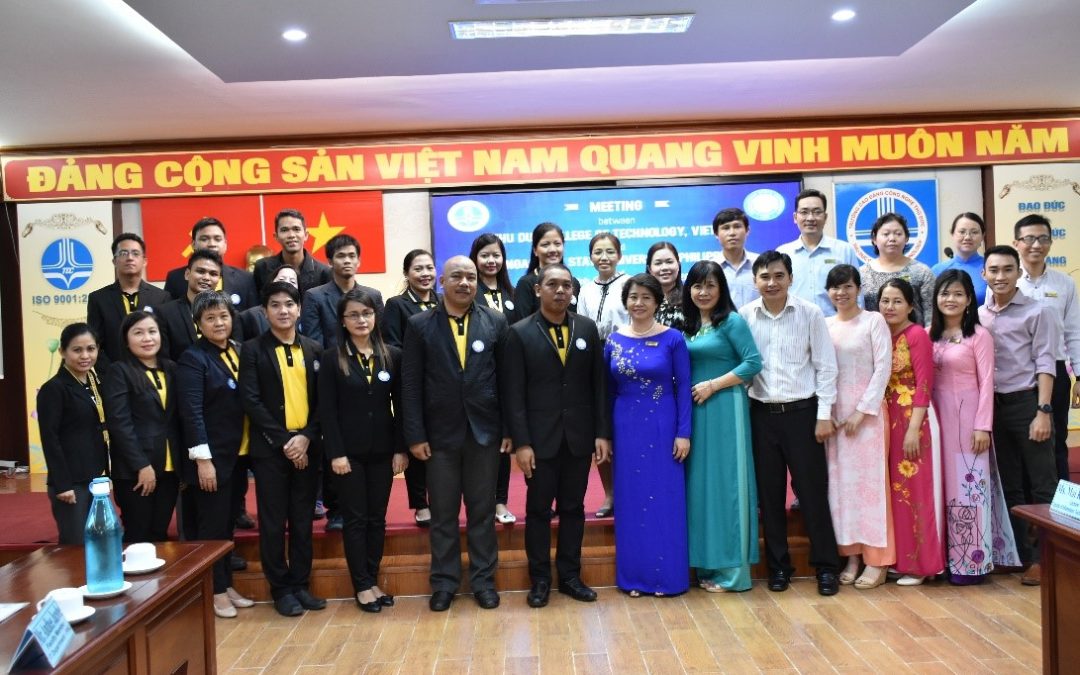On November 19, 2018, sixteen (16) delegates from Pangasinan State University – Urdaneta City Campus visited Thu Duc College of Technology (TDC) in Ho Chi Minh City, Vietnam. The visit aimed to start an academic collaboration, share ideas and experiences, and build friendship and linkage between the two educational institutions.

The delegation was headed by Engr. Rodel Hacla, together with Dr. Frederick Patacsil, the Dean of College of Computing, Mr. Michael Acosta and Ms. Jennifer Parrone, department chairmen, and faculty members of College of Computing.



The visit started with an opening program, where TDC students showcased their talents as gifts to the delegates. After this, Ms. Nguyen Thi Ly, President of TDC, gave her opening remarks, warmly welcoming the PSU delegation. An exchange of gifts between two schools ensued. This is followed by the introduction of the delegates from both institutions, which includes the Faculty of the Information Technology (FIT) department of TDC.
This was followed by two working sessions. The morning session included the introduction of each institution. TDC, through Ms. Bui Thanh Yen Thao, Lecturer of FIT – TDC, presented the profile of their college, program offerings, international linkages, and an overview of the researches their faculty has conducted.
They also presented the Conceive-Design-Implement-Operate (CDIO) framework of their curriculum. They communicated the adoption of the framework, including its development and status, as well as their experiences and difficulties in adopting the curriculum model. This was followed by the presentation of PSU. An audio-visual presentation was viewed, introducing PSU Urdaneta City to TDC. Followed by the research presentations by selected faculty members of PSU.


Mrs. Kristen Bhing V. Salvio presents the research entitle “Developing a Homegrown Course Management System for PSU” and Dr. Christine Lourrine S. Tablatin talks about the “Design and Development of and Information Technology Fundamentals Multimedia Courseware for Dynamic Learning Environment”.


Mr. Andhee M. Jacobe presents the research entitled “Pattern Recognition of Suicidal Ideation” while Mr. Paul Andrew V. Roa presents the research on “Development of an Online Compendium for Pangasinan State University”.

Mr. Nguyen Huy Hoang, Lecturer of FIT – TDC, hosted the afternoon session. The afternoon working session includes discussion of the two institutions regarding the presentations in the morning session, as well as the experiences regarding CDIO curricular model. In this session, both institutions asked questions and shared ideas, which made for an interesting and fruitful discussion.
Mr. Nguyen Huy Hoang, Lecturer of FIT – TDC, hosted the afternoon session. The afternoon working session includes discussion of the two institutions regarding the presentations in the morning session, as well as the experiences regarding CDIO curricular model. In this session, both institutions asked questions and shared ideas, which made for an interesting and fruitful discussion.
TDC shared its curricular framework, syllabi format, and assessment strategies which utilizes the CDIO framework. It was shown that in the construction of the curriculum, the developers look at the targets from the CDIO framework and contextualize these targets to suit the needs of their program, much like how PSU develop its curriculum based on set standards. These set standards are then mapped to determine which targets or competencies are pre-requisites, taught in classes, or applied in the classroom. Questions were asked regarding the format of their curriculum map and syllabus, and it was realized that their format is very similar to the Outcomes-Based Education framework that PSU currently adopts.
Questions were raised by PSU regarding the involvement of enterprises in the determination of targets in each program, which is one feature of their curriculum development. It was revealed that they involve enterprise through consultation, which is important since they will be one of the final recipients of the products of their programs. This is further strengthened by their strong ties with numerous enterprises both local and international, including Japan and Korea.
TDC also shown interest in assessment of students. In the CDIO model, teachers are expected to assess their students in knowledge, skills, and attitudes. They expressed their need of suggestions regarding student assessment in the aspect of attitude. Currently, they assess their students through the use of rubrics to determine their attitude in class, but this proved to be inconvenient and inefficient, especially for large classes. PSU expressed concern regarding the amount of time the teachers give towards assessment than actual instruction, and suggested different ways on student assessment. However, it was also emphasized that measurement of attitude was not a prominent feature in PSU curriculum.
TDS also inquired about the researches that has been presented. Notable questions include access and usefulness of the developed courseware for IT fundamentals. TDC inquired whether the materials uploaded in the system are available outside the campus where the program is implemented. They also showed concern regarding how it can be efficiently used, given slow internet access, especially if many students access the materials at the same time. PSU responded that the system can only be accessed through the local area network, and that the speed in which the students can access the system can be slow. They also informed TDS that the contents of the said courseware will be redeveloped to better suit the current curriculum, making it more useful to IT students.
This was followed by the comparison of different student and faculty portals for both institutions. It was again discovered that the two schools have similar features. Interest was shown by TDS to the workings or the student portal, especially in what the student can access or view in their accounts. These features are also present in TDC. However, some features of the TDC portal, especially the faculty portal, has additional features, including faculty journal or diary. This feature allows faculty members to record what they would do for a certain day for a given class.
The meeting was followed by a tour of TDC, where the delegates visited different sites of the school, including their libraries, computer and engineering laboratories, classrooms, session halls, and bakery. Instructional materials, such as books and manuals, and facilities for both academic and non-academic development were viewed. After the tour, PSU and TDC exchanged school badges as a sign of friendship between the two institutions.

